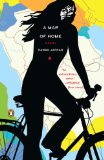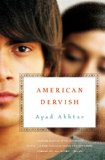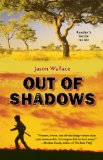Summary | Excerpt | Reading Guide | Reviews | Beyond the book | Read-Alikes | Genres & Themes | Author Bio

A Map of Home begins with the aftermath of Nidali's birth. Her
father names her
Nidal, thinking she's a boy, adding the "i" only after realizing his mistake.
So begins a
journey filled with expectation, chaos, love, music and strife. The novel
could easily
form the backbone for an independent film with its hyperbolic characters,
dialogue
zingers, rapid pacing, and everything from war to multiculturalism to a
teenager's first
sexual explorations. The territory covered in this debut is handled with
grace by Jarrar,
whose eye for imagery is equal to that of a cinematographer's: the pianos
saved by Mama
decorating the Texas yard, the announcement for Baba's poetry reading, Wonder
Woman
stickers adorning a headboard, a car burning in the desert, and even ordinary
occurrences
with the potential to become running gags, like the making of
za'tar,
burgers with cheese or Nidali's trips to the bidet, all carefully placed as
markers for the
characters' many transitions.
A few moments strain believability. When Nidali's love interest reappears on
a
bicycle after she's already given up, or when she encounters him again on the
beach, the
moments feel scripted, but if it's a small criticism to say the book stumbles
with a few
film clichés, it's also a compliment to say you wish you could see these
pages in
technicolor. It's a testament to the writer's skill that one becomes invested
in the
characters.
Readers familiar with films like Bend it Like Beckham or My Big Fat
Greek
Wedding will recognize the awkwardness of navigating more than one
culture, how
ethnicity is sometimes played for humor, and how the negotiation between
parental
desires and those of the protagonist lead to the eternal tug between
tradition and
independence, memory and assimilation. Such films often struggle by remaining
on the
level of mini-crises with heartfelt or resigned but altogether expected
resolutions. A Map
of Home, similarly, ends the way you think it would. There's little tension
about Nidali's
fate, but plenty about the path she takes towards that conclusion.
The book is a little darker than the aforementioned movies. Nidali's relationship with her parents is
complicated by
an abusiveness stemming from frustration for her perceived failures. Every
curse or slap
emphasizes that if growing up is tough, it's likely twice as hard when your
best allies
sometimes appear to act against you, until you understand their reasons. One of the
strongest
features in this book is that willingness to allow for generational
differences without
reducing the characters to simple archetypes. By the time Mama urges Nidali
to never
forget them, the moment has been earned.
The third section is particularly interesting, shifting briefly to the
second-person
point of view and back to the first person. This section also offers a view at a world
that native speakers of English tend to accept without questioning. A "tag sale" is
not, in fact, a sale of tags. Jarrar combines such insights with Nidali's
mounting
determination to leave home.
Coming-of-age themes are common, but the intelligent narration provides
more than enough interest to sustain the momentum. Rare is the book that
makes one stay
up to finish it; this is one of them, simultaneously circling in its family
dramas and
spiraling outwards in its connections to history and place. Adult and teen
readers alike
would enjoy Nidali's honest portrayal. She's the Muslim equivalent of J.D.
Salinger's Holden Caulfield, tender, caustic and wise in all the right moments.
Randa Jarrar was born in Chicago in 1978, and grew up in Kuwait and
Egypt. She is a writer and translator whose award-winning fiction has appeared
in Ploughshares as well as in numerous anthologies. Her translations from the
Arabic have appeared in Words Without Borders: The World Through the Eyes of
Writers; recently, she has translated Hassan Daoud’s novel, The Year of the
Revolutionary New Bread-Making Machine. She currently lives in Ann Arbor,
Michigan. A Map of Home is her first novel.
Interesting Link: "You are a 14-Year-Old Arab Chick Who Just Moved to Texas" by Randa Jarrar.
![]() This review was originally published in The BookBrowse Review in October 2008, and has been updated for the
September 2009 edition.
Click here to go to this issue.
This review was originally published in The BookBrowse Review in October 2008, and has been updated for the
September 2009 edition.
Click here to go to this issue.

If you liked A Map of Home, try these:

by Ayad Akhtar
Published 2012
American Dervish is a brilliantly written, nuanced, and emotionally forceful look inside the interplay of religion and modern life.

by Jason Wallace
Published 2011
A compelling, thought-provoking novel about race, bullying and the need to belong, set in Africa.
Your guide toexceptional books
BookBrowse seeks out and recommends the best in contemporary fiction and nonfiction—books that not only engage and entertain but also deepen our understanding of ourselves and the world around us.